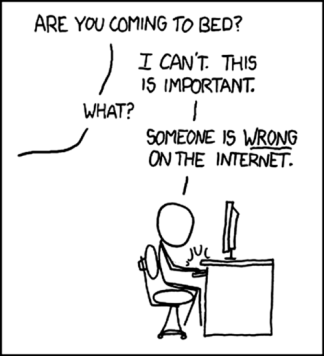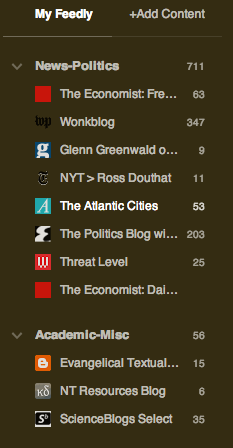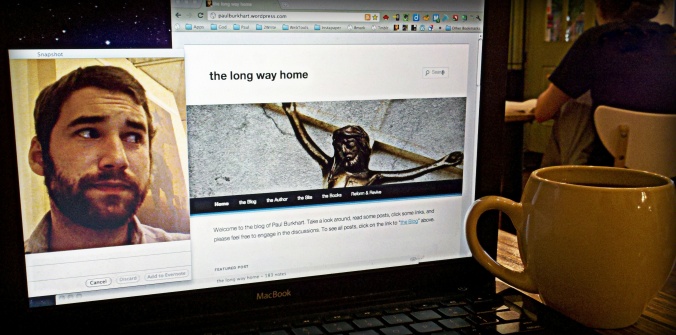I pride myself on thinking that a large percentage of the readers of this blog have no idea of this odd subculture/alternate universe that is the “Christian blogosphere”. So for those that don’t know: there is a very large labyrinth of (largely evangelical) blogs and conferences and podcasts and websites that are dedicated to talking about “the” “Christian view” on any manner of things that (1) really don’t affect much of people’s real lives or (2) seem kind of weird to have a “Christian view” of.
It’s not simply talking about things from a Christian perspective (like this blog), but rather doing so with a particular reactive, evangelical, tribal “flavor”. I’m sure I fall into that at times here, but I’m not proud of it and I try to act against it.
the dangers of the Christian blogosphere
There are two primary things about the nature of these sites that more easily lend themselves to human weakness, I feel.
First, by narrowing the parameters of what constitutes the “Christian blogosphere”, it makes everyone feel far more important and “influential” than they actually are. Typically this group of blogs and sites are young American (usually white) evangelicals, not very rooted in a historical tradition, and that tend to talk to their own group more than to anyone else.
When you narrow your perspective and audience that much, that can so dangerously and easily lead you to think that you are a much bigger deal in the world and in others’ lives than you actually are. These blogs do not easily lend themselves to humility.
 Secondly, the immediacy of blogging and the ease with which Christians naturally fall into cultural superiority and arrogance can turn these blogs into conversations about “Christian opinions” on “those people out there”. If you look at these blogs, almost every post, it seems, is some reactive comment or opinion piece about something else.
Secondly, the immediacy of blogging and the ease with which Christians naturally fall into cultural superiority and arrogance can turn these blogs into conversations about “Christian opinions” on “those people out there”. If you look at these blogs, almost every post, it seems, is some reactive comment or opinion piece about something else.
And when this happens, the reactive blogs are then responded to and then those responses are reacted to and then the response’s responses are reacted to. And the cycle continues and “controversies arise” and “crises in the Church” occur. (Admittedly, I’ve sometimes contributed to the fray.) And it all sounds so dire and important and earth-shattering. And yet you’d be hard-pressed to find almost any normal person on the street have any idea this stuff was going on at all.
Case-in-point: the Strange Fire conference that happened last week. Did you hear about it? I’m happy to say that I genuinely think most readers of this blog did not.
I’m also happy to say that I hadn’t heard of it until running across a random social media post talking about the “firestorm” this had caused throughout the American Church. I had no idea what they were talking about and so I Googled it. And indeed, the Christian blogosphere had blown up. And I had had no idea. And that made me feel pretty good. That’s what got me thinking about all of this.
my story
I used to be all over this stuff in college. I read the books, the blogs, and listened the sermons of the same four or five guys that everyone I hung out with seemed to read and listen to. In our little local campus ministry and church crew, I really felt like this was where the bleeding edge of the Kingdom of God was. This is where it was happening. This was where God was moving and I was in the midst of it in a special and unique way!
The big shift for me happened, after coming to seminary and maintaining my ties to my college church. They paid for me to go with them to a conference where a bunch of these guys were going to be speaking. I jumped at the chance.
Not only was it weird just how much like a professional business conference this whole thing was with corporate sponsor booths and salespeople walking around, but the main thing that struck me was just how exactly alike we all were. The thousands of people at this conference all spoke the same, dressed the same, walked the same, argued about the same things, thought the same things were “endangering the Church”, read/listened to the same guys, etc., etc.
Suddenly this world I thought was so special and important was suddenly revealed as more of a culture than the Kingdom.
 I think I can mark that time as when I started getting “sermon podcast fatigue” and “Christian blog burnout”. Yes, I still read theology, but not the “Christian living” books these guys write (that are often billed as “theology”). I still argued with people over doctrinal matters, but I’ve thought that Fundamentalism is probably more dangerous for the long-term integrity of the church than Universalism. I still spoke to political and cultural issues of the day, but I have fought my damnedest to not fit an of the traditional right-left molds in doing so, and have sought to not give easy and simplistic answers.
I think I can mark that time as when I started getting “sermon podcast fatigue” and “Christian blog burnout”. Yes, I still read theology, but not the “Christian living” books these guys write (that are often billed as “theology”). I still argued with people over doctrinal matters, but I’ve thought that Fundamentalism is probably more dangerous for the long-term integrity of the church than Universalism. I still spoke to political and cultural issues of the day, but I have fought my damnedest to not fit an of the traditional right-left molds in doing so, and have sought to not give easy and simplistic answers.
But most importantly, I feel, I stayed the heck away from these silly evangelical blogs. The only “Christian” blogs I subscribe to are First Things, Ross Douthat’s blog at the New york Times, the Cardus think-tank articles, and Pete Enn’s wonderful blog. That’s it.
Outside of those, I read a lot political, economic, technology, and news sites (as well as some personal friends who write wonderfully). You can see some of them in the picture to the right. And, at least for now, I really like this balance. As Karl Barth once said: “take your Bible and take your newspaper, and read both. But interpret newspapers from your Bible.”
In conclusion, can I first thank those of you that engage in real life with your faith and not neglect real life on account of your pet Christian doctrines?
And secondly, can I invite those of you so fervid about Christian blogs and “keeping up” with the happenings around western (white) conservative evangelicalism, to just stop for a little bit and take a break? Take a month off. Read a different site instead. I promise you, you won’t regret it.


Reblogged this on Sunday School on Steroids-The Seminary Experience.
LikeLike
Reblogged this on ammasf.
LikeLike
ecumenical orthodoxy!
LikeLike
it just rolls off the tongue, doesn’t it?
LikeLike
This is a problem not just in Christian circles 😉
LikeLike
I don’t know whether that’s encouraging or depressing, haha.
LikeLike
The second to last paragraph is a good point to meditate on 🙂 thanks
LikeLike
Pingback: Mark Driscoll: Now just another fundie, but it still hurts | the long way home | Prodigal Paul